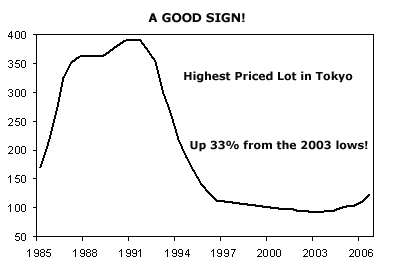| Home | About Us | Resources | Archive | Free Reports | Market Window |
|
Editor's note: If you'd like to learn more about investing in Japanese real estate, you can also read Steve's essay, Six Reasons Why Japanese Real Estate Will Soar. The Big Problem With Japanese Real EstateBy
Thursday, February 8, 2007
Lately in DailyWealth, I've been writing about how Japanese real estate is a 15-year, one-way bet. Prices remain down by 75% from a decade and a half ago... but nearly all the charts show the turnaround is finally here – at least in Tokyo.
So how do we buy? We have a lot of options... The first decision is whether we want to buy actual real estate in Japan or do we want to buy it through a stock that holds Japanese real estate?
The big problem for us, in buying Japanese real estate through stocks, is PRICE. Unfortunately, the real estate conglomerates are generally way overpriced. The three giants below have soared by hundreds of percent in the last few years and now trade at astronomical valuations...
So it's time to look at J-REITs instead, which hold portfolios of properties and pay out the rent to shareholders. Unfortunately, the picture doesn't get a whole lot better when we size up the possibilities in office REITs... The major J-REITs currently trade for about twice what you could sell their buildings for. Here's how I get to that... These major J-REITs have been around an average of less than five years. And over five years, real estate prices haven't moved too much in Tokyo – first down a bit, and now up a bit. So the book values of these companies are a rough gauge of the value of the buildings they hold. As you can see, these stocks are not a good deal now:
Would you buy a building for 100% more than its market value? Then you wouldn't buy these J-REITs, either. I feel that the residential J-REITs (owners of apartments and condo buildings) offer the best values trading locally in Japan. Nippon Residential is the big player here... and it's only at a 20% premium over book value and pays a 4.1% dividend.
Market NotesMAKING DOUBLE-DIGIT GAINS... THE SAFE WAY Of the stock trends that started cooking in 2006, two come to mind when guessing which have years to run: The rise of cheap, blue-chip stocks, and the rise of companies involved in drugs and healthcare. Our colleague Porter Stansberry capitalized on both of these with his recommendation of healthcare giant Johnson & Johnson (JNJ) seven months ago, with this to say: "As bad a bet as big cap stocks have been for eight years, they're not a bad bet anymore. They're a sure thing right now... which is why, of course, most investors want nothing to do with them. Most people have an unfailing desire to purchase investments today that should have been bought five years ago. Contrarily, most people have no interest in what's safe and cheap right now. Go figure." As Porter's super-safe 10% gain in J&J shows, buying what nobody wants is the surest way to make money in stocks. |
Recent Articles
|


